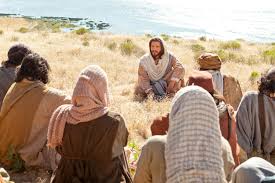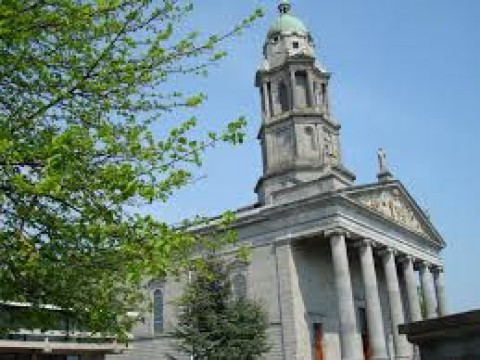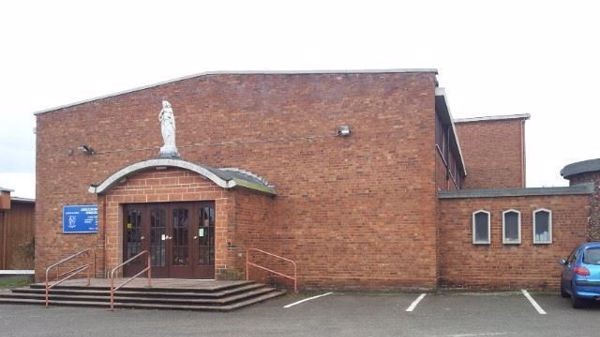Churches of the Day
Pictorial Thought for Today
Mar 3 - St Katharine Drexel(1)- 1858-1955- American nun

Summary: St Katharine Drexel, was an American of Austrian origin (canonised by John Paul II in 2000), inherited a fortune, but chose to spend it on the education and spiritual needs of Afro- and native Americans, founded the Sisters of the Blessed Sacrament to work for the indigenous and black population and lived a long life of devotion.
Patrick Duffy tells her story.
Of a banking family - loving and Catholic
Born in Philadelphia of a banking family of Austrian origin, Katharine was the second of three daughters. Her own mother died shortly after she was born, and two years later her father re-married. Her step-mother Emma Bouvier was particularly loving and the family was devoutly Catholic and well-educated. Her step-mother spent large amounts of money each year on the care of the poor in Philadelphia city.
Fr James O'Connor visiting in their home
A frequent visitor to the home was an Irish-born priest, Fr James O'Connor, who was teaching in the seminary at Philadelphia. He was concerned with the physical and educational poverty of the native Americans (so-called Indians) and worked hard to improve their condition.
Travels in Europe and the north-western states
Katharine travelled to Europe three times. Seeing the house of Catherine of Siena awakened in her an interest in religious life. She spoke of her interest to Father O'Connor, who advised a prudent delay. Later when he was appointed vicar apostolic of Nebraska, Katharine visited him in the north-west herself and saw the plight of the native peoples at first hand.
Audience with the Pope
At this time the Canadian authorities had already honoured their agreements with native peoples, but the American authorities did not. Some time later at an audience with Pope Leo XIII in Rome, Katharine asked him to send more missionaries to Wyoming to help the now Bishop James O'Connor. The Pope replied, "Why don't you become a missionary yourself?" When she got home that was what she did. But first she and her sisters, Elizabeth and Louise, founded a Drexel Chair of Moral Theology at Washington University (DC).
Education for native and African Americans
Katharine entered the novitiate of the Sisters of Mercy in Pittsburgh and went through the formation process, nursing the sick in the Mercy hospital. In 1891 twelve postulants joined her religious congregation to work for the education and spiritual needs of native and African Americans. Even though she lived under a vow of poverty, she was a one-person administrator of $400,000 a year, which was the interest from a trust fund set up for her by her father before he died.
A school for native Americans in New Mexico
Katharine opened her first mission school for native Americans at Sante Fe in New Mexico in 1894. This was followed by additional schools for native Americans west of the Mississippi and schools for blacks in the South. In the large cities like New York, Chicago and Boston there was a demand for her nuns. She became known as "Mother Drexel" and in 1915 she established Xavier University in New Orleans - the first black university in America. She forbade any mention of her name when it was dedicated.
Later years
When Katharine was seventy-six, she suffered a cerebral hemorrhage and had to retire from active administration. When she died in Philadelphia in 1955 aged ninety-seven, her pall bearers represented several races. For the last twenty years she lived a life of prayer in a wheelchair. Her congregation - originally called the Sisters of the Blessed Sacrament for Indians and Coloured People, now called simply Sisters of the Blessed Sacrament - is still engaged on the work she began. Pope John Paul II beatified her in 1988 and canonised her in 2000.
******************************
Memorable Saying for Today
A great soul serves everyone all the time.
A great soul never dies.
It brings us together, again and again
~ Maya Angelou ~
******************************
Tuesday of the Second Week of Lent
Penance and prayer prepares us us for God's implanting the seed that leads to Eternal life in God.
Saint of the Day: Mar 3 : St Katherine Drexel, Religious Founder
C/f A short life of be this saint can found below todays' Readings and Reflection.
FIRST READING
A reading from the prophet Isaiah 1:10, 16-20
Learn to do good, search for justice.
Hear the word of the Lord, you rulers of Sodom; listen to the command of our God, you people of Gomorrah.
‘Wash, make yourselves clean.
 Take your wrong-doing out of my sight.
Take your wrong-doing out of my sight.Cease to do evil. Learn to do good, search for justice, help the oppressed, be just to the orphan, plead for the widow.
'Come now, let us talk this over, says the Lord.
Though your sins are like scarlet, they shall be as white as snow; though they are red as crimson, they shall be like wool.
'If you are willing to obey, you shall eat the good things of the earth. But if you persist in rebellion, the sword shall eat you instead.'
The mouth of the Lord has spoken.
The Word of the Lord Thanks be to God
Responsorial Psalm Ps 49:8-9. 16-17. 21. 23. R/v 23
Response I will show God's salvation to the upright.
1. 'I find no fault with your sacrifices, your offerings are always before me.
I do not ask more bullocks from your farms, nor goats from among your herds. Response
2. 'But how can you recite my commandments and take my covenant on your lips,
you who despise my law and throw my words to the winds. Response
3. 'You do this, and should I keep silence? Do you think that I am like you?
A sacrifice of thanksgiving honours me and I will show God's salvation to the upright.' Response
Gospel Acclamation Mt 4:17
Glory and praise to you, O Christ !
Repent, says the Lord, for the kingdom of heaven is close at hand.
Glory and praise to you, O Christ !
or Ez 18:31
Glory and praise to you, O Christ !
Shake off all your sins - it is the Lord who speaks-
and make yourselves a new heart and a new spirit.
Glory and praise to you, O Christ !
GOSPEL
The Lord be with you. And with your spirit
A reading from the holy Gospel according to Matthew 23:1-12 Glory to you, O Lord
They do not practise what they preach.
Addressing the people and his disciples Jesus said,
'The scribes and the Pharisees occupy the chair of Moses. You must therefore do what they tell you and listen to what they say; but do not be guided by what they do: since they do not practise what they preach. They tie up heavy burdens and lay them on men's shoulders, but will they lift a finger to move them? Not they!

Everything they do is done to attract attention, like wearing broader phylacteries and longer tassels, like wanting to take the place of honour at banquets and the front seats in the synagogues, being greeted obsequiously in the market squares and having people call them' Rabbi.'
'You, however, must not allow yourselves to be called 'Rabbi,' since you have only one master, and you are all brothers.
You must call no one on earth your father, since you have only one Father, and he is in heaven.
Nor must you allow yourselves to be called teachers, for you have only one Teacher, the Christ.
The greatest among you must be your servant. Anyone who exalts himself will be humbled, and anyone who humbles himself will be exalted.'
The Gospel of the Lord Praise to you, Lord Jesus Christ.
******************************
Gospel Reflection Tuesday , Second Week of Lent Matthew 23:1-12
Jesus is very critical in this gospel reading of those religious leaders who impose unnecessary burdens on an already burdened people through their strict interpretation of the Jewish Law. Jesus had earlier called on those who were overburdened to come to him, promising them rest, declaring that his teaching, his interpretation of God’s will for our lives, was not burdensome. Most people carry burdens of one kind or another, very often brought on by others. Jesus is clear in this reading that our relationship with God is not intended to be another burden on a burdened people. Jesus allowed himself to be burdened by the constraints of the human condition. Among the burdens he carried was the burden imposed by those who were hostile to all he stood for. Jesus was at his most burdened as he hung from the cross on Calvary. He carried our burdens so that he could help us to carry our own burdens. Through his life, death and resurrection, he released into the world the power of God’s love, the power of the Holy Spirit, which is not an oppressive power but a life-giving, enabling, power.
Saint Paul was very burdened as he wrote to the church in Philippi from his prison cell. Yet, he could say to that church, ‘I can do all things through him who strengthens me’ (Phil 4:13). The Lord strengthens us to carry our burdens so that we can help to carry the burdens of others. As Paul writes to the churches of Galatia, ‘Bear one another’s burdens, and in this way you will fulfil the law of Christ’ (Gal 6:2). The law of Christ, which is the law of love, the fruit of the Spirit, is not about burden imposing but burden lifting.
_________________
The Scripture Readings are taken from The Jerusalem Bible, published 1966 by Darton, Longman & Todd Ltd. and used with the permission of the publishers. http://dltbooks.com/
The Scripture Reflection is made available with our thanks from his book Reflections on the Weekday Readings : The Word is near to you, on your lips and in your heart by Martin Hogan and published by Messenger Publications c/f www.messenger.ie/bookshop/
__________________________________
Saint of the Day: Mar 3 : St Katherine Drexel, Religious Founder
Katharine Drexel, was an American of Austrian origin (canonised by John Paul II in 2000), inherited a fortune, but chose to spend it on the education and spiritual needs of Afro- and native Americans, founded the Sisters of the Blessed Sacrament to work for the indigenous and black population and lived a long life of devotion.
Patrick Duffy tells her story.
Of a banking family - loving and Catholic

Born in Philadelphia of a banking family of Austrian origin, Katharine was the second of three daughters. Her own mother died shortly after she was born, and two years later her father re-married. Her step-mother Emma Bouvier was particularly loving and the family was devoutly Catholic and well-educated. Her step-mother spent large amounts of money each year on the care of the poor in Philadelphia city.
Fr James O'Connor visiting in their home
A frequent visitor to the home was an Irish-born priest, Fr James O'Connor, who was teaching in the seminary at Philadelphia. He was concerned with the physical and educational poverty of the native Americans (so-called Indians) and worked hard to improve their condition.
Travels in Europe and the north-western states
Katharine travelled to Europe three times. Seeing the house of Catherine of Siena awakened in her an interest in religious life. She spoke of her interest to Fr O'Connor, who advised a prudent delay. Later when he was appointed vicar apostolic of Nebraska, Katharine visited him in the north-west herself and saw the plight of the native peoples at first hand.
Audience with the Pope
At this time the Canadian authorities had already honoured their agreements with native peoples, but the American authorities did not. Some time later at an audience with Pope Leo XIII in Rome, Katharine asked him to send more missionaries to Wyoming to help the now Bishop James O'Connor. The Pope replied, "Why don't you become a missionary yourself?" When she got home that was what she did. But first she and her sisters, Elizabeth and Louise, founded a Drexel Chair of Moral Theology at Washington University (DC).
Education for native and African Americans
Katharine entered the novitiate of the Sisters of Mercy in Pittsburgh and went through the formation process, nursing the sick in the Mercy hospital. In 1891 twelve postulants joined her religious congregation to work for the education and spiritual needs of native and African Americans. Even though she lived under a vow of poverty, she was a one-person administrator of $400,000 a year, which was the interest from a trust fund set up for her by her father before he died.
A school for native Americans in New Mexico
Katharine opened her first mission school for native Americans at Sante Fe in New Mexico in 1894. This was followed by additional schools for native Americans west of the Mississippi and schools for blacks in the South. In the large cities like New York, Chicago and Boston there was a demand for her nuns. She became known as "Mother Drexel" and in 1915 she established Xavier University in New Orleans - the first black university in America. She forbade any mention of her name when it was dedicated.
Later years
When Katharine was seventy-six, she suffered a cerebral hemorrhage and had to retire from active administration. When she died in Philadelphia in 1955 aged ninety-seven, her pall bearers represented several races. For the last twenty years she lived a life of prayer in a wheelchair. Her congregation - originally called the Sisters of the Blessed Sacrament for Indians and Coloured People, now called simply Sisters of the Blessed Sacrament - is still engaged on the work she began.
Pope John Paul II beatified her in 1988 and canonised her in 2000.
******************************
Memorable Saying for Today
A great soul serves everyone. A great soul never dies.
It brings us together, again and again
~ Maya Angelou ~
******************************
Sliocht as an fáidh Íseáia 1:10, 16-20
Foghlaimígí an mhaith a dhéanamh, lorgaigí an rud cóir.
Éistigí le briathar an Tiarna, a thaoisigh Shodom; tugaigí cluas do reacht ár nDé, a phobal Ghomorá!
 Nígí, glanaigí sibh féin. Tógaigí bhur n-urchóid as mo radharc.
Nígí, glanaigí sibh féin. Tógaigí bhur n-urchóid as mo radharc.Éirigí as an olc a dhéanamh! Foghlaimígí an mhaith a dhéanamh,
lorgaigí an rud cóir, cuirigí in éadan ansmachta,
tugaigí a cheart don dílleachta, agraigí cúis na baintrí.
Gabhaigí i leith ansin agus pléimis an scéal, a deir an Tiarna.
Má bhíonn bhur bpeacaí ar nós craoraig, déanfar níos gile iad ná sneachta;má bhíonn siad chomh dearg leis an gcorcra, amhail olann a dhéanfar iad.
Má thoilíonn sibh a bheith umhal, íosfaidh sibh de thoradh na talún;
ach má leanann sibh sa stailc agus sa cheannairc, is é béal an chlaímh a íosfaidh sibhse.”
Tá béal an Tiarna tar éis labhairt.
Briathar an Tiarna Buíochas le Dia
Salm le Freagra Sm 49:8-9. 16-17. 21. 23. R/v 23
Freagra Taispeánfaidh me slánú Dé don té a mhaireann go hionraic.
1. Ní de bharr d’íobairtí a cháinim thú: bíonn do loiscíobairtí i mo láthair de shíor.
Ní ghlacfaidh mé le tarbh ó do theach ná le pocaide gabhair de do thréada. Freagra
2. “Cén ceart atá agatsa mo dhlí a fhógairt agus lán béil a dhéanamh de mo chonradh?
Ó tharla gur fuath leat mo dhlí agus go ndéanann tú neamhní de mo bhriathra? Freagra
3. Déanann tú amhlaidh, agus an mbeidh mise i mo thost? An dóigh leat gurb é do dhálasa agamsa é?
an té a ghabhann buíochas mar íobairt, taispeánfaidh mé slánú Dé.” Freagra
SOISCÉAL
Go raibh an Tiarna libh. Agus le do spiorad féin
Sliocht as an Soiscéal naofa de réir Naomh Matha 6:36-38 Glóir duit, a Thiarna
Ní mar a chéile beart agus briathar acu.
San am sin labhair Íosa ansin leis na sluaite agus lena dheisceabail:
“Tá na scríobhaithe agus na Fairisínigh ina suí i gcathaoir Mhaois, agus ó tá siad, déanaigí agus coinnígí a ndeir siad libh, ach ná déanaigí de réir a n-oibreacha, óir ní mar a chéile beart agus briathar acu. Ceanglaíonn siad suas ualaí troma do-iompair agus buaileann siad ar ghuaillí daoine iad, ach ní áil leo féin iad a bhogadh le barr méire. Déanann siad a n-oibreacha uile d’fhonn go mbeifí á dtabhairt faoi deara.
 Sin mar a chuireann siad leithead ina bhfiolaictéirí agus fad lena scothóga; is maith leo an chéad áit sna fleánna agus na príomhshuíocháin sna sionagóga, agus go mbeifí ag beannú dóibh sna háiteanna poiblí, agus go mbeifí ag tabhairt ‘raibí’ orthu.
Sin mar a chuireann siad leithead ina bhfiolaictéirí agus fad lena scothóga; is maith leo an chéad áit sna fleánna agus na príomhshuíocháin sna sionagóga, agus go mbeifí ag beannú dóibh sna háiteanna poiblí, agus go mbeifí ag tabhairt ‘raibí’ orthu.Ach ná bíodh ‘raibí’ á thabhairt oraibhse; óir níl ach an t-aon Mháistir oraibh, agus is bráithre sibhse uile.
Agus ná glaoigí bhur ‘n-athair’ ar aon duine ar an talamh, óir níl agaibh ach an t-aon Athair, an té atá ar neamh.
Agus fós, ná bíodh ‘múinteoirí’ á thabhairt oraibh, óir níl agaibh ach an t-aon Mhúinteoir, an Críost.
An té agaibh is uaisle, beidh sé ina sheirbhíseach daoibh.
Agus cibé duine a ardóidh é féin, ísleofar é agus cibé duine a ísleoidh é féin ardófar é.
Soiscéal an Tiarna. Moladh duit, a Chriost
AN BÍOBLA NAOFA
© An Sagart
Third Sunday of Lent, Year A
Through the Spirit of God the gift of love is poured into our hearts, a gift bought by the blood of Christ.
This is true for all Christians, new and old. But it needs to be constantly prayed for.
First Scrutiny of Catechumens is celebrated today
FIRST READING
A reading from the Book of Exodus 17:3-7
Give us water to drink.
 Tormented by thirst, the people complained against Moses. 'Why did you bring us out of Egypt?' they said. 'Was it so that I should die of thirst, my children too, and my cattle?' Moses appealed to the Lord. 'How am I to deal with this people? he said. 'A little more and they will stone me!'
Tormented by thirst, the people complained against Moses. 'Why did you bring us out of Egypt?' they said. 'Was it so that I should die of thirst, my children too, and my cattle?' Moses appealed to the Lord. 'How am I to deal with this people? he said. 'A little more and they will stone me!'The Lord said to Moses,
'Take with you some of the elders of Israel and move on to the forefront of the people; take in your hand the staff with which you struck the river, and go. I shall be standing before you there on the rock, at Horeb. You must strike the rock, and water will flow from it for the people to drink.'
This is what Moses did, in the sight of the elders of Israel. The place was named Massah and Meribah because of the grumbling of the sons of Israel and because they put the Lord to the test by saying, 'Is the Lord with us, or not?'
The Word of the Lord Thanks be to God.
Responsorual Psalm Ps 94:1-2, 6-9, R/v8
Response O that today you would listen to his voice,
harden not your hearts.
1. Come, ring out our joy to the Lord; hail the rock who saves us.
Let us come before him, giving thanks, with songs let us hail the Lord. Response
2. Come in; let us bow and bend low; let us kneel before the God who made us
for he is our God and we the people who belong to his pasture,
the flock that is led by his hand. Response
3. O that today you would listen to his voice! 'Harden not your hearts as at Meribah,
as on that day at Massah in the desert when your fathers put me to the test;
when they tried me, though they saw my work.' Response
SECOND READING
A reading from the first letter of St Paul to the Romans 5:1-2. 5-8
The love of God has been poured into our hearts by the Holy Spirit which has been given us.
 Through our Lord Jesus Christ, by faith we are judged righteous and at peace with God, since it is by faith and through Jesus that we have entered this state of grace in which we can boast about looking forward to God's glory and this hope is not deceptive, because the love of God has been poured into our hearts by the Holy Spirit which has been given us. We were still helpless when at his appointed moment Christ died for sinful men. It is not easy to die even for a good man - though of course for someone really worthy, a man might be prepared to die - but what proves that God loves us is that Christ died for us while we were still sinners.
Through our Lord Jesus Christ, by faith we are judged righteous and at peace with God, since it is by faith and through Jesus that we have entered this state of grace in which we can boast about looking forward to God's glory and this hope is not deceptive, because the love of God has been poured into our hearts by the Holy Spirit which has been given us. We were still helpless when at his appointed moment Christ died for sinful men. It is not easy to die even for a good man - though of course for someone really worthy, a man might be prepared to die - but what proves that God loves us is that Christ died for us while we were still sinners.The Word of the Lord Thanks be to God.
Gospel Acclamation Jn 4: 42.15
Glory and praise to you, O Christ !
Lord, you are really the saviour of the world;
give me the living water, so that I may never get thirsty.
Glory and praise to you, O Christ !
GOSPEL
The Lord be with you. And with your spirit
A reading from the Gospel according to John 4:5-42 Glory to you, O Lord
A spring inside him, welling up to eternal life'
Jesus came to the Samaritan town called Sychar, near the land that Jacob gave to his son Joseph. Jacob's well is there and Jesus, tired by the journey, sat straight down by the well. It was about the sixth hour When a Samaritan woman came to draw water,
Jesus said to her, 'Give me a drink'.
His disciples had gone into the town to buy food. The Samaritan woman said to him,
'What? You are a Jew and you ask me, a Samaritan, for a drink?' - Jews, in fact, do not associate with Samaritans.
Jesus replied:
 If you only knew what God is offering and who it is that is saying to you: Give me a drink, you would have been the one to ask, and he would have given you living water'.
If you only knew what God is offering and who it is that is saying to you: Give me a drink, you would have been the one to ask, and he would have given you living water'.'You have no bucket, sir,' she answered 'and the well is deep: how could you get this living water? Are you a greater man than our father Jacob who gave us this well and drank from it himself with his sons and his cattle?'
Jesus replied 'Whoever drinks this water will get thirsty again;
but anyone who drinks the water that I shall give will never be thirsty again: the water that I shall give will turn into a spring inside him, welling up to eternal life'.
'Sir,' said the woman 'give me some of that water, so that I may never get thirsty and never have to come here again to draw water.'
'Go and call your husband' said Jesus to her 'and come back here.'
The woman answered, 'I have no husband'.
He said to her, You are right to say, "I have no husband"; for although you have had five, the one you have now is not your husband. You spoke the truth there.'
'I see you are a prophet, sir' said the woman.
'Our fathers worshipped on this mountain, while you say that Jerusalem is the place where one ought to worship.'
Jesus said: 'Believe me, woman, the hour is coming when you will worship the Father neither on this mountain nor in Jerusalem. You worship what you do not know; we worship what we do know: for salvation comes from the Jews.
But the hour will come - in fact it is here already – when true worshippers will worship the Father in spirit and truth: that is the kind of worshipper the Father wants. God is spirit, and those who worship must worship in spirit and truth.'
The woman said to him, 'I know that Messiah - that is, Christ - is coming; and when he comes he will tell us everything'.
'I who am speaking to you,' said Jesus 'I am he.'
At this point his disciples returned, and were surprised to find him speaking to a woman, though none of them asked, 'What do you want from her?' or, 'Why are you talking to her?'
The woman put down her water jar and hurried back to the town to tell the people.
'Come and see a man who has told me everything I ever did; I wonder if he is the Christ?' This brought people out of the town and they started walking towards him.
Meanwhile, the disciples were urging him, 'Rabbi, do have something to eat; but he said,
'I have food to eat that you do not know about'.
So the disciples asked one another, 'Has someone been bringing him food?'
But Jesus said: 'My food is to do the will of the one who sent me, and to complete his work.
Have you not got a saying: 'Four months and then the harvest?'
Well, I tell you: Look around you, look at the fields; already they are white, ready for harvest!
Already the reaper is being paid his wages, already he is bringing in the grain for eternal life,
and thus sower and reaper rejoice together.
For here the proverb holds good: one sows, another reaps; I sent you to reap a harvest you had not worked for. Others worked for it; and you have come into the rewards of their trouble.'
Many Samaritans of that town had believed in him on the strength of the woman's testimony when she said, 'He told me all I have ever done', so, when the Samaritans came up to him, they begged him to stay with them. He stayed for two days, and when he spoke to them many more came to believe; and they said to the woman, 'Now we no longer believe because of what you told us; we have heard him ourselves and we know that he really is the saviour of the world'.
The Gospel of the Lord Praise to you, Lord Jesus Christ.
*****************************
For homily resources for this Sunday's Gospel click here: https://www.catholicireland.net/sunday-homily/
The scripture readings are taken from THE JERUSALEM BIBLE, published in 1966 by Darton, Longman and Todd Ltd and used with permission of the publishers.
Sliocht as Leabhar Exodus 17:3-7
Tabhair dúinn uisce le hól.
 Bhí íota tarta ar an bpobal agus rinneadar monabhar in aghaidh Mhaois.
Bhí íota tarta ar an bpobal agus rinneadar monabhar in aghaidh Mhaois.“Cad chuige ar thug tú amach as an Éigipt sinn?” ar siad.
“An d’fhonn go gcuirfeá sinn féin agus ár gclann agus ár stoc chun báis le tart?”
Ghlaoigh Maois ar an Tiarna: “Cad a dhéanfaidh mé leis an bpobal seo? Is beag nach bhfuil siad ag gabháil de chlocha ionam.”
Agus dúirt an Tiarna le Maois:
“Tabhair leat cuid de sheanóirí Iosrael agus téigh ar thosach an phobail. Beir i do láimh ar an tslat lenar bhuail tú an abhainn, agus seo leat. Féach! beidh mé i mo sheasamh ansiúd ar an gcarraig romhat (i Horaeb). Buail an charraig agus snífidh uisce aisti le hól ag an bpobal.”
Agus rinne Maois amhlaidh i láthair sheanóirí Iosrael. Thug sé Masá agus Miríbeá ar an áit de bharr chasaoid chlann Iosrael agus go ndearnadar promhadh ar an Tiarna á rá: “An bhfuil an Tiarna farainn nó nach bhfuil?”
Briathar an Tiarna Buíochas le Dia
Salm le Freagra Sm 94:1-2, 6-9, R/v8
Freagra Á, dá n-éistfeadh sibh lena ghuth inniu: 'Ná calcaigí bhur gcroí.'
1. Tagaigí, déanaimis gairdeas don Tiarna, tógaimis gártha áthais do Charraig ár slánaithe.
Tagaimis ina láthair le moltaí, déanaimis gairdeas dó le laoithe. Freagra
2. Tagaigí, adhraimis agus sléachtaimis, feacaimis ár nglúine don Tiarna a rinne sinn.
Óir is é ár nDia é, agus is sinne pobal a aoireachta agus caoirigh a lámh. Freagra
3. Á, dá n-éistfeadh sibh lena ghuth inniu: 'Na calcaigí bhur gcroí mar a tharla i Meríba,
mar a tharla an lá úd ag Masá san fhásach mar ar chuir bhur n-aithreacha cath orm,
mar ar thriail siad mé cé go bhfaca siad m'obair.' Freagra
DARA LÉACHT
Sliocht as Litir Naomh Pól chuig na Rómhánaigh 5:1-2. 5-8
Tá ár gcroí líonta de ghrá Dé tríd an Spiorad Naomh a tugadh dúinn
 Dá bhrí sin, ó táimid fíréanaithe ag an gcreideamh, tá síocháin againn le Dia trínár dTiarna Íosa Críost, mar is trídsean atá teacht againn le creideamh ar an ngrásta seo ina mairimid. Agus ábhar mórála dúinn is ea an dóchas go bhfuil glóir Dé i ndán dúinn. Agus ní amháin sin ach is ábhar mórála dúinn ár dtrioblóidí agus a fhios againn go dtagann foighne ón trioblóid, agus diongbháilteacht ón bhfoighne agus dóchas ón diongbháilteacht. Ní chliseann an dóchas seo orainn mar tá ár gcroí líonta de ghrá Dé tríd an Spiorad Naomh a tugadh dúinn. Nuair a bhíomar fós lag, fuair Críost bás i dtráth ar son drochdhaoine. Is ar éigean a gheobhadh fear bás ar son duine chóir féin – is ea, b’fhéidir go mbeadh sé de chroí aige bás a fháil ar son dea-dhuine. Ach cruthaíonn Dia an grá atá aige dúinn trí Chríost a fháil bháis ar ár son agus sinn fós inár bpeacaigh.
Dá bhrí sin, ó táimid fíréanaithe ag an gcreideamh, tá síocháin againn le Dia trínár dTiarna Íosa Críost, mar is trídsean atá teacht againn le creideamh ar an ngrásta seo ina mairimid. Agus ábhar mórála dúinn is ea an dóchas go bhfuil glóir Dé i ndán dúinn. Agus ní amháin sin ach is ábhar mórála dúinn ár dtrioblóidí agus a fhios againn go dtagann foighne ón trioblóid, agus diongbháilteacht ón bhfoighne agus dóchas ón diongbháilteacht. Ní chliseann an dóchas seo orainn mar tá ár gcroí líonta de ghrá Dé tríd an Spiorad Naomh a tugadh dúinn. Nuair a bhíomar fós lag, fuair Críost bás i dtráth ar son drochdhaoine. Is ar éigean a gheobhadh fear bás ar son duine chóir féin – is ea, b’fhéidir go mbeadh sé de chroí aige bás a fháil ar son dea-dhuine. Ach cruthaíonn Dia an grá atá aige dúinn trí Chríost a fháil bháis ar ár son agus sinn fós inár bpeacaigh.Briathar an Tiarna Buíochas le Dia
Comhghair an tSoisceil Eo 4:42, 15
A Thiarna, is tú dáiríre Slánaitheoir an tsaoil;
tabhair dom on t-uisce beo i dtreo nach mbeidh tart orm choíche.
SOISCÉAL
Sliocht as Soiscéal naofa de réir Naomh Eoin 4:5-42
Tobar uisce ag brúchtail chun na beatha síoraí.
San am sin tháinig Íosa mar sin go cathair sa tSamáir darbh ainm Suchar, láimh leis an bhfearann a thug Iacób dá mhac Iósaef. Ansiúd a bhí tobar Iacóib. Mar go raibh Íosa traochta ón aistear, shuigh sé ag an tobar. Timpeall an séú huair a ba ea é. Tháinig bean ón tSamáir ag tarraingt uisce.
Dúirt Íosa léi: “Tabhair dom deoch.” Bhí a dheisceabail imithe isteach don chathair ag ceannach bia. Dúirt an Samárach mná leis ansin: “Conas go n-iarrann tusa, agus gur Giúdach thú, deoch ormsa agus gur Samárach mná mé?” Ní bhíonn aon chaidreamh ag Giúdaigh ar Shamáraigh.

D’fhreagair Íosa: “Dá mba eol duit tabhartas Dé,” ar sé léi,“agus cé hé a deir leat:
‘ Tabhair dom deoch,’ is tusa a bheadh ag iarraidh airsean, agus thabharfadh sé duit uisce beo.”
“Níl aon bhuicéad agat, a dhuine uasail,” arsa an bhean leis, “agus tá an tobar domhain. Cad as mar sin a gheobhfá an t-uisce beo seo? An amhlaidh gur mó thú ná ár n-athair Iacób a thug dúinn an tobar agus gur ól sé féin as agus a chlann agus a thréada?”
D’fhreagair Íosa:
“Gach duine a ólann an t-uisce seo,” ar sé léi, “beidh tart arís air. Ach má olann aon duine an t-uisce a thabharfaidh mise dó, ní bheidh tart air go brách na breithe. Ach an t-uisce a thabharfaidh mise dó, déanfaidh tobar uisce de istigh ann, ag brúchtaíl chun na beathn síoraí.”
Dúirt an bhean leis:
“A dhuine uasail, tabhair dom an t-uisce sin i dtreo nach mbeidh tart orm choíche, agus nach gcaithfidh mé teacht anseo ag tarraingt uisce.”
Dúirt sé léi: “Imigh agus glaoigh ar d’fhear agus fill anseo.”
D’fhreagair an bhean: “Níl fear agam,”
Dúirt Íosa léi: “Is maith a dúirt tú: ‘Níl fear agam’; óir bhí cúigear fear agat agus an té atá anois agat ní hé d’fhear é. D’inis tú an fhírinne sa mhéid sin.”
Dúirt an bhean leis: “A dhuine uasail, feicim gur fáidh thú. Ar an gcnoc seo a rinne ár n-aithreacha Dia a adhradh, ach deir sibhse gur in Iarúsailéim atá an áit in ar cóir adhradh a dhéanamh.”
Dúirt Íosa léi: “Creid uaimse é, a bhean go bhfuil an uain ag teacht nuair nach ar an gcnoc seo ná in Iarúsailéim a dhéanfaidh sibh an tAthair a adhradh. Adhrann sibhse an ní nach eol daoibh; adhraimidne an ní is eol dúinn; mar is ó na Giúdaigh an slánú.
Ach tá an uain ag teacht, agus is anois féin é, ina ndéanfaidh lucht an fhíoradhartha an tAthair a adhradh sa Spiorad agus san fhírinne; óir sin iad an sórt is mian leis an Athair á adhradh. Spiorad é Dia, agus lucht a adhartha is i spiorad agus i bhfírinne a chaithfidh siad adhradh.”
Dúirt an bhean leis: “Tá a fhios agam go bhfuil an Meisias ag teacht” – is é sin le rá an Críost – “agus nuair a thiocfaidh seisean inseoidh sé gach aon ní dúinn.”
Dúirt Íosa léi: “Mise é atá ag caint leat.”
Lena linn sin tháinig a dheisceabail agus rinne siad ionadh de go raibh sé ag caint le bean. Ní dúirt aon duine acu, áfach: “Cad tá uait?” ná “Cén fáth tú a bheith ag caint léi?”
Lig an bhean a crúsca uaithi ansin agus d’imigh léi isteach don chathair agus dúirt leis na daoine:
“Tagaigí go bhfeicfidh sibh fear a d’inis dom gach ní dá ndearna mé. An féidir gurb é an Criost é?”
Ghluais deoine amach as an gcathair agus bhí siad ag dul ina threo.
Lena linn sin bhí a dheisceabail ag tathant air: “A raibí,” ar siad leis, “bí ag ithe.”
Dúirt sé leo: “Tá agam bia le hithe nach eol daoibhse.”
Ansin dúirt na deisceabail lena chéile: “An féidir gur thug duine éigin rud le hithe dó?”
Dúirt Íosa leo “Is é is bia domsa toil an té a chuir uaidh mé a dhéanamh agus a obair a chur i gcrích.
Nach ndeir sibhse ‘Ceithre mhí eile agus beidh an fómhar ann’?
Seo mise á rá libh: Tógaigí bhur súile agus féachaigí ar na goirt; tá siad geal chun an fhómhair.
Tá a thuarastal á fháil ag an mbuanaí cheana féin, agus tá toradh á bhailiú aige chun na beatha síoraí, i dtreo go bhfuil lúcháir ar an síoladóir agus ar an mbuanaí in éineacht.
Óir is fíor don seanfhocal sa mhéid seo: ‘ Cuireann duine, baineann duine eile.’ Sheol mise sibhse uaim chun fómhar a bhaint nár shaothraigh sibh féin. Shaothraigh daoine eile é, agus chuaigh sibhse isteach ina saothar.”
Chreid a lán de Shamáraigh na cathrach sin ann de bharr fhocal na mná ag tabhairt na fianaise: “D’inis sé dom gach ní dá ndearna mé.”
Nuair a tháinig na Samáraigh chuige dá bhrí sin bhí siad ag tathant air fanacht faróthu, agus d’fhan sé ansiúd dhá lá. Ba mhó go mór a chreid de bharr a bhriathair agus deiridís leis an mbean:
“Ní mar gheall ar do chuid cainte a chreidimid a thuilleadh; óir chualamar féin é agus tá a fhios againn gurb é seo dáiríre Slánaitheoir an domhain.”
Soiscéal an Tiarna. Moladh duit, a Chriost
AN BÍOBLA NAOFA
© An Sagart




